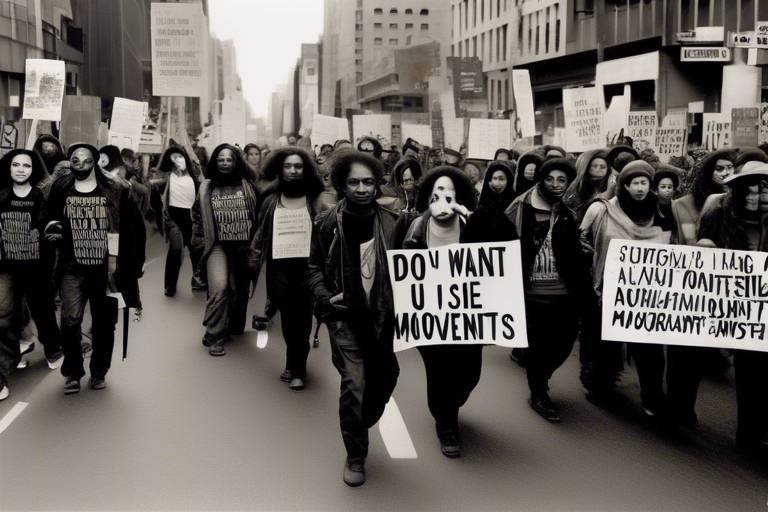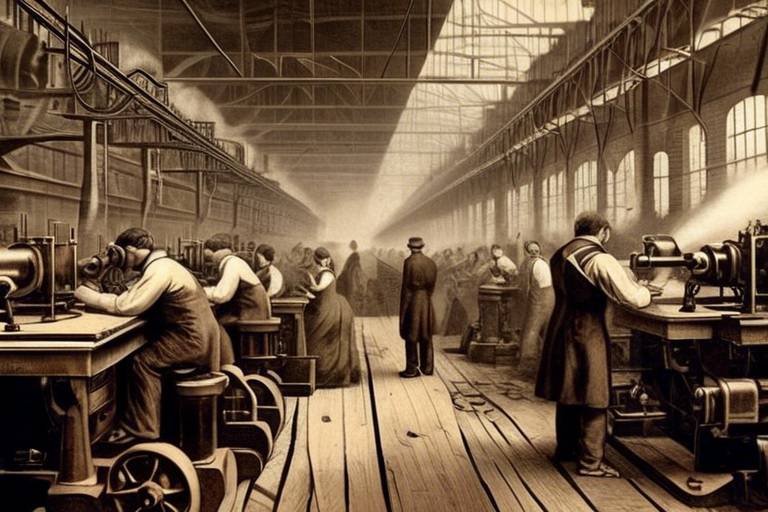The History of Political Thought - From Ancient to Modern
Political thought has a rich and diverse history that spans across centuries, shaping societies and governments worldwide. From the ancient civilizations of Greece, Rome, and China to the modern era of globalization, the evolution of political ideas has been a fascinating journey. Key thinkers and philosophers have contributed their insights, laying the foundation for the political landscape we see today.
Ancient political thought delved into the fundamental questions of governance and society. Philosophers like Plato, Aristotle, and Confucius offered profound perspectives on justice, virtue, and the ideal state. Their works provided a blueprint for future generations of thinkers, influencing political theory for centuries to come.
As the Middle Ages unfolded, political thought intertwined with religious institutions and feudal structures. Figures like St. Augustine and Thomas Aquinas grappled with the relationship between church and state, shaping the discourse on power and authority during this period.
The Renaissance and Enlightenment periods brought a wave of new ideas that challenged traditional beliefs. Thinkers like Machiavelli, Locke, and Rousseau championed individual rights, social contract theory, and the concept of popular sovereignty. These concepts laid the groundwork for modern democratic principles and governance.
Modern political ideologies emerged in response to the industrial revolution and changing social dynamics. Liberalism, conservatism, socialism, and communism became prominent schools of thought, with thinkers like Adam Smith, Karl Marx, and John Stuart Mill shaping political discourse and policy decisions.
Feminist political theory introduced critical perspectives on gender equality and women's rights. Scholars explored the intersection of gender, power, and politics, challenging traditional notions of authority and representation in society.
Postmodern political philosophy questioned the foundations of traditional political theories. Postmodernism critiqued power structures, language, and truth, highlighting the complexities of political discourse and decision-making in a rapidly changing world.
Globalization has reshaped political thought, raising debates on sovereignty, democracy, and the role of international institutions. The interconnectedness of nations has led to new challenges and opportunities in shaping contemporary political ideologies and policies.
Looking ahead, the future of political theory is marked by uncertainty and innovation. Emerging issues such as technology, climate change, and social justice movements are reshaping the political landscape, prompting scholars to rethink traditional paradigms and explore new avenues of governance and policy-making.

Ancient Political Thought
Ancient political thought encompasses the foundational ideas and philosophies developed by early civilizations such as Greece, Rome, and China. These ancient societies laid the groundwork for future political thinkers by exploring concepts of governance, justice, and the role of the state in society.
In ancient Greece, renowned philosophers like Plato and Aristotle delved into the nature of politics and the ideal state. Plato's "Republic" discussed the concept of justice and the role of philosopher-kings in governing society, while Aristotle's "Politics" examined different forms of government and the importance of the middle class in maintaining stability.
Similarly, in ancient China, the teachings of Confucius emphasized the importance of ethical leadership and social harmony. Confucian thought focused on the moral cultivation of individuals and the proper conduct of rulers to ensure a just and prosperous society.
These ancient political thinkers grappled with fundamental questions about power, authority, and the relationship between rulers and the ruled. Their ideas continue to influence political discourse and theory to this day, shaping our understanding of governance and society.

Medieval Political Theory
During the Middle Ages, political thought was heavily influenced by the power dynamics between religious institutions and feudal systems. The concept of divine right of kings was prevalent, asserting that monarchs ruled by the will of God. This period saw the emergence of prominent thinkers like St. Augustine and Thomas Aquinas, who sought to reconcile Christian theology with political governance.
St. Augustine, a key figure in medieval political theory, emphasized the importance of the City of God over earthly cities, advocating for the separation of church and state. His writings laid the groundwork for the idea of a just ruler who upholds moral principles in governance, reflecting the fusion of religious and political authority during that era.
Thomas Aquinas, a theologian and philosopher, further developed the concept of natural law, positing that there are universal moral principles that govern human behavior and should guide political decision-making. Aquinas's work bridged the gap between faith and reason, influencing subsequent political thought by emphasizing the importance of ethical governance.
The feudal system, characterized by a hierarchical structure of lords, vassals, and serfs, also shaped medieval political theory. Feudal relationships were based on reciprocal obligations and loyalty, with power centralized in the hands of feudal lords who held authority over their vassals and territories.
Overall, the medieval period was marked by a complex interplay between religious authority, feudal structures, and philosophical inquiries into the nature of political power and governance. The works of St. Augustine and Thomas Aquinas, among others, continue to be studied for their enduring impact on the development of political thought.

The Renaissance and Enlightenment
The Renaissance and Enlightenment were pivotal periods in the history of political thought, marking a shift towards new ideas and philosophies that would shape the modern world. During the Renaissance, thinkers like Machiavelli challenged traditional notions of political authority and morality, advocating for a pragmatic approach to governance. His work, The Prince, explored the use of power and the relationship between rulers and subjects.
On the other hand, the Enlightenment brought forth a wave of intellectual and philosophical change, emphasizing reason, individual rights, and the social contract theory. John Locke, a key figure of this era, proposed the idea of natural rights and the consent of the governed as the basis for legitimate government. His work laid the foundation for modern liberal democracy.
Rousseau, another prominent Enlightenment thinker, introduced the concept of the general will and the idea of popular sovereignty. His ideas on democracy and the social contract influenced revolutions and the development of modern political systems.
These periods not only revolutionized political thought but also paved the way for the emergence of democratic principles and the protection of individual freedoms. The Renaissance and Enlightenment challenged traditional authority and set the stage for the modern political landscape we see today.

Modern Political Ideologies
Modern Political Ideologies have played a significant role in shaping contemporary political thought and governance systems. This period witnessed the emergence of diverse ideologies such as liberalism, conservatism, socialism, and communism, each offering unique perspectives on governance, economy, and society.
Liberalism, championed by thinkers like John Locke and John Stuart Mill, emphasizes individual rights, freedom, and limited government intervention in the economy. It advocates for free markets, democracy, and the protection of civil liberties as essential components of a just society.
Conservatism, on the other hand, values tradition, order, and stability in society. Influential conservative thinkers like Edmund Burke and Michael Oakeshott argue for the preservation of established institutions, social hierarchy, and gradual change to maintain societal cohesion and continuity.
Socialism, as articulated by Karl Marx and Friedrich Engels, advocates for collective ownership of the means of production, redistribution of wealth, and the elimination of class distinctions. It aims to create a more egalitarian society by reducing economic disparities and promoting social welfare programs.
Communism, an offshoot of socialism, seeks to establish a classless society where the state withers away, and resources are distributed based on need. The ideas of Marx and Engels on the revolutionary overthrow of capitalism and the establishment of a communist utopia have had a lasting impact on political movements worldwide.
These modern political ideologies continue to influence policy debates, political movements, and governance structures globally. While each ideology offers distinct solutions to societal challenges, they also spark debates on the role of the state, individual rights, economic organization, and social justice in contemporary politics.

Feminist Political Theory
Feminist Political Theory delves into the intersection of gender, power, and politics, offering critical insights into the historical marginalization of women in political discourse. It challenges traditional notions of governance and policy-making by advocating for gender equality and women's rights as fundamental components of a just society. Feminist political thinkers have contributed significantly to reshaping the political landscape by highlighting the importance of inclusivity, diversity, and representation in decision-making processes.
One key aspect of Feminist Political Theory is the emphasis on dismantling patriarchal structures that perpetuate gender inequalities in political systems. By deconstructing power dynamics and advocating for the recognition of women's agency, feminist theorists seek to create a more equitable and inclusive political environment where all individuals have a voice in shaping policies that affect their lives. This approach not only challenges traditional power structures but also promotes a more holistic understanding of politics that takes into account diverse perspectives and experiences.
Furthermore, Feminist Political Theory explores the ways in which gender intersects with other social categories such as race, class, and sexuality to shape individuals' experiences within political institutions. By acknowledging the complexities of identity and privilege, feminist thinkers aim to address systemic injustices and advocate for policies that promote social justice and equality for all marginalized groups. This intersectional approach to political theory highlights the interconnected nature of power dynamics and the importance of addressing multiple forms of oppression simultaneously.
In addition to critiquing existing political systems, Feminist Political Theory also offers innovative solutions for creating more inclusive and equitable societies. Through concepts such as care ethics, relational autonomy, and participatory democracy, feminist theorists propose alternative models of governance that prioritize empathy, collaboration, and community building. These approaches challenge traditional notions of leadership and decision-making by centering values of care, compassion, and mutual respect in political processes.
Overall, Feminist Political Theory serves as a powerful tool for reimagining political structures and practices in ways that promote gender equality, social justice, and human rights. By centering the experiences and perspectives of marginalized groups, feminist thinkers contribute to a more inclusive and representative political discourse that seeks to address the diverse needs and concerns of all individuals in society.

Postmodern Political Philosophy
Postmodern Political Philosophy delves into the complexities of modern political thought by challenging traditional theories and structures. In this philosophical realm, thinkers question established power dynamics, language constructs, and the very notion of truth that underpins political decision-making. Postmodernism brings to light the subjective nature of reality and the ways in which language shapes our understanding of politics.
One key aspect of postmodern political philosophy is its critique of power structures. It questions the hierarchical systems that govern societies and highlights the ways in which power can be wielded unequally. By deconstructing these power dynamics, postmodern thinkers aim to reveal hidden biases and inequalities that influence political discourse and policies.
Language plays a crucial role in postmodern political philosophy, as theorists examine how language constructs reality and shapes our understanding of political concepts. The focus on language highlights the importance of communication in political decision-making and emphasizes the need for critical analysis of the language used in political discourse.
Moreover, postmodern political philosophy challenges the notion of a universal truth in politics. Instead, it recognizes multiple perspectives and truths that are shaped by individual experiences and cultural backgrounds. This perspective encourages a more inclusive approach to political theory, acknowledging the diverse viewpoints that exist within society.
In conclusion, postmodern political philosophy offers a unique lens through which to view contemporary political issues. By questioning traditional theories and structures, postmodernism opens up new avenues for exploring the complexities of power, language, and truth in political thought and decision-making.

Globalization and Political Thought
Globalization has significantly impacted political thought, reshaping the way we perceive and approach governance on a global scale. The interconnectedness of economies, cultures, and societies has led to a reevaluation of traditional political ideologies and policies.
One key aspect of globalization in political thought is the ongoing debate on sovereignty. As nations become increasingly interdependent, questions arise regarding the extent to which states can maintain full autonomy in a globalized world. The balance between national sovereignty and international cooperation has become a central theme in contemporary political discourse.
Furthermore, globalization has raised concerns about the effectiveness of democratic systems in addressing transnational issues. The rise of global challenges such as climate change, terrorism, and economic inequality has highlighted the need for collaborative efforts and multilateral decision-making processes.
International institutions play a crucial role in shaping political thought in the era of globalization. Organizations like the United Nations, World Bank, and International Monetary Fund influence policy decisions and promote global governance mechanisms that transcend national borders.
The impact of globalization on political thought is also evident in the rise of populist movements and nationalist sentiments in response to perceived threats to local identities and interests. The tension between global interconnectedness and local autonomy has sparked debates on the future direction of governance and the role of nation-states in a rapidly changing world.

The Future of Political Theory
Speculating on the future directions of political thought in a rapidly changing world opens up a realm of possibilities and challenges. As we stand on the cusp of a new era, where technology, climate change, and social justice movements are reshaping the very fabric of society, the future of political theory appears both daunting and exhilarating.
One potential path that political thought may take is a deeper integration of technology into governance and decision-making processes. With the rise of artificial intelligence, big data analytics, and blockchain technology, governments may find new ways to enhance transparency, efficiency, and citizen engagement in political systems.
Moreover, the looming threat of climate change is likely to become a central focus of future political theory. As environmental issues continue to escalate, political thinkers may need to grapple with questions of sustainability, resource management, and global cooperation to address the pressing challenges posed by a changing climate.
Additionally, the growing influence of social justice movements around the world is reshaping the discourse on equality, diversity, and inclusion in political theory. Issues of racial justice, gender equality, LGBTQ+ rights, and economic equity are pushing political thinkers to reevaluate traditional power structures and advocate for more inclusive and equitable policies.
Furthermore, the interconnected nature of our globalized world is likely to compel political theorists to rethink traditional notions of sovereignty and national identity. As international institutions and transnational networks play an increasingly significant role in shaping political decisions, the future of political theory may involve a reimagining of borders, citizenship, and global governance.
In conclusion, the future of political theory holds immense potential for innovation, collaboration, and transformation. By embracing emerging technologies, addressing environmental challenges, championing social justice causes, and redefining global relationships, political thinkers have the opportunity to shape a more inclusive, sustainable, and equitable world for generations to come.
Frequently Asked Questions
- What is political thought?
Political thought refers to the study and analysis of ideas, theories, and philosophies related to politics, governance, and societal organization. It encompasses a wide range of perspectives on power, authority, justice, and the role of government in society.
- Who are some key ancient political thinkers?
Ancient political thought was shaped by influential figures such as Plato, Aristotle, Confucius, and Cicero. These thinkers laid the groundwork for Western political philosophy with their ideas on justice, democracy, and the ideal state.
- What are the main modern political ideologies?
Modern political ideologies include liberalism, conservatism, socialism, and communism. These ideologies offer differing perspectives on individual rights, government intervention, economic systems, and social equality.
- How has globalization impacted political thought?
Globalization has influenced political thought by raising questions about sovereignty, international cooperation, and the balance of power between nations. It has also led to debates on the role of supranational organizations in a globalized world.
- What is feminist political theory?
Feminist political theory focuses on issues of gender equality, women's rights, and the intersection of gender with politics and power dynamics. It seeks to challenge traditional notions of power and advocate for a more inclusive and equitable society.



















